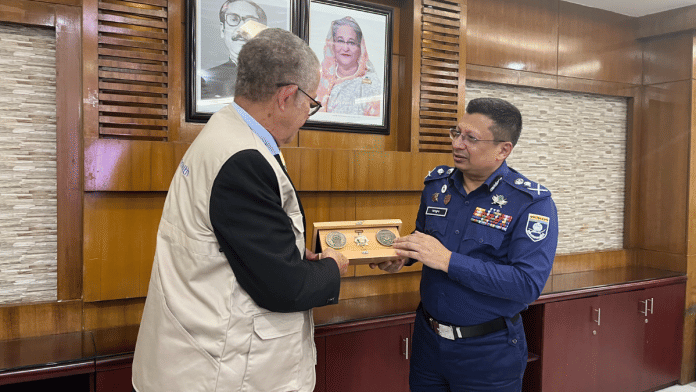New Delhi: In a dramatic reversal, Bangladesh’s former police chief Chowdhury Abdullah Al-Mamun has become a state witness against ex-prime minister Sheikh Hasina, placing full blame on her for last year’s deadly July crackdown and offering a public apology to the nation.
Mamun is the first International Crimes Tribunal (ICT) defendant to plead guilty and become an approver, a state witness granted pardon in exchange for full cooperation. He is to be cross-examined Wednesday.
In his testimony before the ICT Tuesday, Mamun said that the July killings were carried out on direct orders of Hasina and home minister Asaduzzaman Khan Kamal.
He then went on to render an emotional apology: “Hearing victims’ testimonies and seeing footage of corpses being burnt shook me deeply. If this full account reveals the truth, I may find some peace, he said.
He then added: “I served 36 and a half years in the police. There were never any allegations against me. But this massacre happened under my watch. I accept responsibility.”
He further revealed that he had received a call from Khan relaying Hasina’s command to deploy lethal weapons. From then on, deadly force was used against protesters, and both police commissioner Habibur Rahman and Detective Branch chief Harun-or-Rashid “were overenthusiastic” in carrying out the orders.
“Pro-Awami intellectuals, journalists, cultural figures, and business leaders encouraged Hasina to crush the movement,” he added.
Mamun also recounted two critical meetings held at Hasina’s official residence Ganabhaban on 4 August, 2024. These gatherings involved high-level officials and were followed by a coordinated police-army operation initiated the next day, Bengali-language daily newspaper Prothom Alo reported.
In his testimony, he mentioned that protesters were targeted using helicopters and drones for surveillance and gunfire, a move he said was part of a broader political decision endorsed by senior cabinet figures. In July, the ICT charged Hasina, Kamal, and Mamun with crimes against humanity, including orchestrating mass killings, deploying military-grade tactics, and targeting unarmed civilians.
“I apologise to the victims’ families, the injured, the nation, and the tribunal,” Mamun said in front of the tribunal.
In July, Bangladesh’s ICT for the first time formally indicted Hasina on charges of crimes against humanity. The charges stem from the government’s response to the widespread anti-government demonstrations in July and August 2024, which ultimately led to Hasina’s ouster in August last year.
Hasina has been in exile in India since 5 August 2024, when her nearly 16-year tenure ended due to the protests. In December 2024, the Muhammad Yunus-led interim administration in Bangladesh sent a diplomatic note to India, requesting her extradition. The Ministry of External Affairs (MEA) confirmed the note but has not responded so far.
(Edited by Tony Rai)
Also Read: Pakistan refuses to apologise for 1971, even as it seeks ‘brotherly’ ties with Bangladesh






